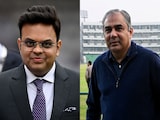- Violent protests in Nepal this week found mention in the Supreme Court
- Chief Justice BR Gavai said, "We are proud of our Constitution"
- "See what is happening in our neighbouring states. Nepal, we saw," the Chief Justice said
Violent protests in Nepal this week (and in Bangladesh in July last year) found mention in the Supreme Court Wednesday afternoon during the hearing of a presidential reference on the court's April 12 order, which set deadlines on President Droupadi Murmu and Governors to clear states' bills.
Referring to the Indian Constitution - which defines the right of the President to seek the Supreme Court's advice, on any point of law that might constitute public importance, or affect the public in any manner - Chief Justice BR Gavai said, "We are proud of our Constitution."
"... see what is happening in our neighbouring states. Nepal, we saw," the Chief Justice said, referring to the anti-corruption agitation that began 48 hours ago, in which 21 people have been killed so far.
READ | Nepal PM Quits Amid Deadly Gen Z Protests, Chaos On Streets
"Yes, Bangladesh also..." Justice Vikram Nath chipped in, raising memories of shocking violence in that country last year as a student-led protest seized control of and ransacked key government buildings, including the official residence of then Prime Minister Sheikh Hasina.
Over 100 people died in protests that forced her to resign and flee, with control of the country handed to a still-in-power 'interim' administration led by Nobel Prize winner Mohd Yunus.
Similarities between the events in Nepal this week and Bangladesh last year are difficult to miss, including the larger point about a complete break-down of Constitution and rule-of-law.
NDTV Special | 2 Leaders, 2 Movements: Parallels Between Nepal, Bangladesh 2024
The Supreme Court's comments today came after Solicitor-General Tushar Mehta defended Governors of states and union territories on the matter of reserving bills for over a month.
While the bench was going through this argument Justice Nath remarked the country has been functioning for the past 75 years irrespective of how many bills had been passed or withheld.
Mr Mehta said he had data that showed the rarity of such an eventuality.
Chief Justice Gavai, however, was unimpressed. "We cannot take statistics... it will not be fair to them (the state arguing against the presidential reference). We did not take their statistics. How can we take yours?" he asked, "We will not go into it... earlier you objected to their statistics."
Undeterred the Solicitor-General declared that 90 per cent of all bills passed by a state government are cleared by the Governor in question within a month. From 1970 to 2025 only 20 bills - including the seven passed by the Tamil Nadu government that Governor RN Ravi delayed, prompting a furious pushback and legal challenges by the ruling DMK - were reserved, Mr Mehta told the top court.
In the past non-BJP ruled states - Tamil Nadu, Kerala, and Punjab - have accused their respective governors, who are appointed by the federal government, of deliberately withholding consent to bills passed by the state legislature or delaying assent by passing it to the President.
READ | Not Every Problem Needs Court: Centre On Presidential Reference
In April, in the context of Tamil Nadu Governor RN Ravi vs the ruling DMK, the court called the former's actions "arbitrary" and "illegal". The court said bills returned to and passed by the state legislature for a second time had to be cleared, either by the Governor or the President, within 30 days.
That verdict has been challenged by the President under Article 143 of the Constitution, which empowers her to seek the court's opinion on any question of law of public importance.
NDTV is now available on WhatsApp channels. Click on the link to get all the latest updates from NDTV on your chat.















